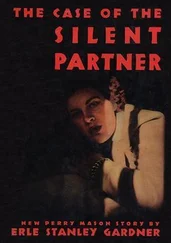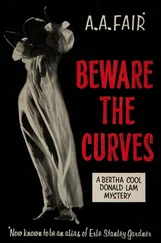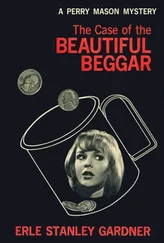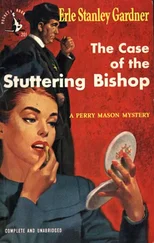Bertha thought for a minute, and then said, “You went to San Francisco on the bus, didn’t you?”
“Yes.”
“And left your car in Santa Carlotta?”
“Yes.”
“And picked it up late this morning?”
“Yes.”
“Then it was someone in Santa Carlotta who pushed your nose back?”
“It was.”
“A cop?” she asked.
I nodded.
“The same one who tried to throw a scare into you at Oakview?”
“Yes.”
“I don’t like it, lover,” she said. “A crooked cop can frame you with something you can’t get out of.”
I grinned and said, “I know it.”
“Well, what are you grinning about?”
“I’m grinning,” I said, “because that’s a game two can play. A clever man can frame a cop so the cop won’t have time to frame anyone else. Right now, in case you want to know it, Sergeant John Harbet is a very busy individual, and I wouldn’t doubt at all if he was making a lot of explanations.”
“Why?” she asked suspiciously. “What’s happened?”
“For one thing,” I said, “he had been hanging around the Blue Cave with Evaline Harris. When they wanted someone to go up to Oakview and get the lay of the land and pick up all the outstanding pictures of Mrs. Lintig, they sent Evaline. When Evaline got murdered and the police started asking questions about who her boy friends were, Harbet brought a lot of pull to hear on the management. I don’t know how much pull, but it was a hell of a lot, and the word was passed around to the girls not to talk about Harbet. Trying to cover it up that way makes it that much worse when the lid is blown off.”
“And is the lid blown off?” she asked.
I nodded.
Bertha Cool looked at me speculatively and said, “Donald, I’d hate to be one to push you in the nose. I have an idea you might find a way to make things awfully uncomfortable for me afterwards.”
“I would,” I promised.
She said, “Come on. Let’s go steal a trunk.”
“You send yourself a telegram first,” I said.
We went around to the Mapleleaf Hotel. The clerk said, “Good evening, Mrs. Cool,” and looked at me suspiciously.
Bertha beamed at him and said, “My son — from military academy.”
The clerk said, “Oh.”
We went up to Bertha Cool’s room and sat around for about fifteen minutes, then the telegram which Bertha Cool had sent herself was delivered. We went down to talk with the night clerk. “Very bad news,” Bertha Cool said. “I have to take an early-morning plane east. I’ll have to get my trunk sent up to my room and pack.”
The clerk said, “The porter isn’t on duty now, but I think we can get it up for you.”
I said, “I can get it into the elevator if you can find a hand truck.”
“There’s one down in the basement,” he said.
Bertha Cool said, “I’ll have to do some packing and unpacking. I’ll have to shift baggage around. I want to take just one trunk and one suitcase. Donald, do you suppose you could get that trunk up for me?”
“Sure,” I said.
The clerk obligingly gave us a key to the basement. We went down and snooped around. Within two minutes we found a trunk with the initials F.D. on it, and a tar: Property of Florence Danzer, Room 602.
We opened Bertha Cool’s trunk and between us managed to lift FIo’s trunk into place. There was quite a bit of room on the sides, and we wadded that with old clothes and newspapers. Then I closed and strapped Bertha’s trunk, got it on a hand truck, and got it to the elevator. Thirty minutes later, a taxicab had the trunk strapped on to a trunk rack, and we were headed for the Union Depot. We switched at the Union Depot just so we wouldn’t leave a back trail, and went to Bertha’s apartment.
The elevator boy dug up a hand truck, and we took the trunk up to Bertha Cool’s apartment. I couldn’t get the lock picked, but it only took a few minutes to cut off the heads of the rivets which held the trunk lock into position.
We found what we wanted before the trunk was more than half unpacked: a packet of papers and documents tied with a stout cord.
I untied the cord, and Bertha and I went over the papers together.
There was the Lintig marriage licence, some letters which Dr. Lintig had written during the courtship while he was still a student in college. There were newspaper clippings, and a photograph of Dr. Lintig and the bride in a wedding dress.
Dr. Lintig had changed somewhat in the twenty-odd years since that photograph had been taken. He was, of course, older, but the change hadn’t been as great as might be expected. He’d evidently been an earnest, studious youth who had looked ten years older than his real age.
I studied the face of the woman in the wedding dress. Bertha put my question into words. “Is that,” she asked, “the woman you saw at the hotel?”
I said, “No.”
“That settles it,” Bertha said. “Donald, we’ve got them licked.”
I said, “You keep forgetting the little matter of a murder.”
We dug deeper into the pile of documents. I came on some papers written in Spanish. Bertha said, “What are these?”
I said, “Let’s see if there isn’t a translation appended to them,” and turned over the pages. “It looks like a Mexican divorce.”
It was.
“Is it any good?” Bertha asked.
“Not much,” I said. “For a while some of the states in Mexico established a one-day residential qualification for getting a divorce and provided that the residence could be by proxy. A whole flock of attorneys did a land-office business getting Mexican divorces. The state supreme court punched holes in those divorces whenever the question came up for consideration, but a lot of California marriages had taken place after a Mexican divorce had been granted. Those marriages were so numerous that the authorities simply closed their eyes to their bigamous aspect and let it go at that. The general concensus of opinions is that they constitute a moral whitewash if not a legal justification.”
Bertha said, “Now why do you suppose she did that, lover?”
I said, “She wanted to re-marry, but she didn’t want Dr. Lintig to know of that marriage. She wanted to hold a club over his head. That was why she got the Mexican divorce. That’s a bet I’ve overlooked.”
“How did you overlook it?” she asked. “And what was the bet?”
I said, “I’ll show you.” I went to the telephone and called Western Union. I dictated a night message to the State Bureau of Vital Statistics at Sacramento, California, asking for information concerning the marriage of Amelia Sellar, and a search of death records for a burial under the married name if they were found.
I hung up the telephone to find Bertha Cool grinning at me. “It looks as though we’re getting somewhere, lover,” she said.
I said, “You must have a list of operatives who can be called at short notice.”
“I do,” Bertha said.
“All right. Get a couple of them. Describe John Harbet. Have them cover police headquarters. I want to know where Harbet goes when he leaves there.”
“Won’t he go back to Santa Carlotta?” she asked.
“I don’t think so,” I said. “Not now.”
Bertha Cool crossed over to a writing-desk and took out a leather-backed notebook. “It may take an hour or so to get them on the job,” she said.
“An hour’s too long,” I told her. “Get, people who can go to work immediately. Hire the operatives of another detective agency. Have them on the job within twenty minutes.” Bertha Cool started telephoning. I went back to the trunk.
I’d found the rest of it by the time Bertha returned from the telephone, some old stage costumes and some vaudeville publicity photographs of a woman in tights with autographs written on them, Lovingly, Flo .
Читать дальше












